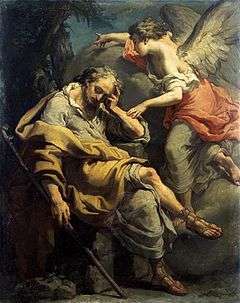Matthew 1:21
Matthew 1:21 is the twenty-first verse of the first chapter in the Gospel of Matthew in the New Testament. This verse contains one of the very first mentions of Jesus (after Matthew 1:1). Joseph is being spoken to in a dream by an angel. In this verse the angel comes to him and tells him of the nature of his child.
| Matthew 1:21 | |
|---|---|
← 1:20 1:22 → | |
 Gaetano Gandolfi's Joseph's Dream, c. 1790 | |
| Book | Gospel of Matthew |
| Christian Bible part | New Testament |
Content
The original Koine Greek, according to Westcott and Hort, reads:
- τεξεται δε υιον και καλεσεις το ονομα αυτου ιησουν αυτος
- γαρ σωσει τον λαον αυτου απο των αμαρτιων αυτων
- (texetai de huion kai kaleseis to onoma autou Iēsoun autos
- gar sōsei ton laon autou apo tōn hamartiōn autōn)
In the King James Version of the Bible the text reads:
- And she shall bring forth a son, and thou shalt call his
- name JESUS: for he shall save his people from their sins.
The World English Bible translates the passage as:
- She shall bring forth a son. You shall call his name Jesus,
- for it is he who shall save his people from their sins."
For a collection of other versions see BibleHub Matthew 1:21
Analysis
This verse is the first clear indication of how the author of Matthew sees Jesus. France notes that in the Old Testament only God had the power to absolve sins thus this verse shows that Jesus will be far greater than any of the prophets and other holy men.[1]
The traditional view is that this verse clearly shows that the role of the messiah would not be one of national liberator, as most Jews had expected, but rather a spiritual liberator. Generally the word translated as people was used to refer to the Jewish people, but "his people" could also refer to all of humanity. Carter disagrees with this opinion. He believes that the author of Matthew originally intended this saving to be political. To Carter the sins of bondage, Roman domination, and economic control were just as important as religious and moral sins. He argues that the rest of the infancy narrative is deeply political with its focus on the Kings of Judah and the deeply sinful King Herod. The verse was reinterpreted when the Second Coming failed to occur and liberate Israel from the empire.[2]
Gundry sees this verse as important evidence of how the author of Matthew viewed sin and salvation. Gundry reports that there are two distinct views of sin in the New Testament. Romans 7 presents sin as a malicious external power that induces people to do evil. Matthew differs from this view. The gospel pluralizes the word sin implying that sin is not a universal force. Moreover, referring to their sins presents sin as the fault of the sinner not of an external force. Gundry argues that by the Romans definition deliverance is saving people from the influence of sin, but in Matthew deliverance is rescuing people from the punishment that will inevitably be meted out for sinning.[3]
References
- France, R.T. The Gospel According to Matthew: an Introduction and Commentary. Leicester: Inter-Varsity, 1985.
- Carter, Warren. Matthew and Empire. Harrisburg: Trinity Press International, 2001.
- Gundry, Robert H. "Salvation in Matthew." Society of Biblical Literature - 2000 Seminar Papers. Atlanta: Society of Biblical Literature, 2000.
| Preceded by Matthew 1:20 |
Gospel of Matthew Chapter 1 |
Succeeded by Matthew 1:22 |
.jpg)